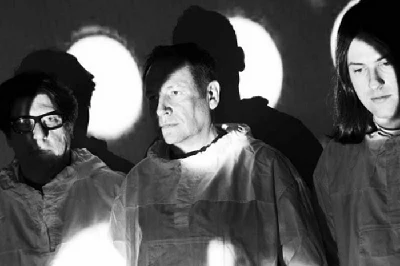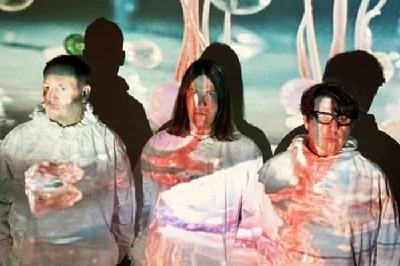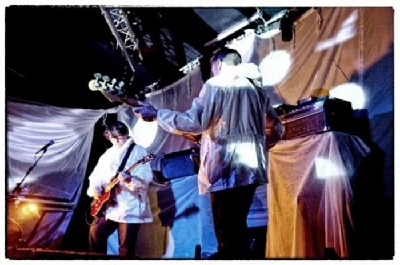published: 25 /
5 /
2013

Echo and The Bunnymen guitarist Will Sergeant talks about Poltergeist, the new 70's progressive rock-influenced/post rock instrumental group, that he has formed with his main group's former bassist Les Pattinson, and their debut album, Your Mind is a Box (Let Us Fill It with Wonder)’
Article
Poltergeist may be a new band in name, but the musicians involved know each other inside and out. Will Sergeant and Les Pattinson formed Echo and & The Bunnymen in 1978, and played together in the band for twenty years before Pattinson left the group.
Today they are reunited and have formed Poltergeist, a band with both feet in the ethos of 70’s progressive rock and instrumental post rock. Also along for the ride is current Bunnyman stickman Nick Kilrow, yet there is an entirely different approach to the band dynamic at work here.
Give even just a cursory listen to their debut album, ‘Your Mind is a Box (Let Us Fill It with Wonder)’, and you will find the trio to be so much more than the sum of their parts. The musical scope and ambition on display has not been seen evident since the Bunnymen’s meteoric rise in the early 1980s. It is a thing of wonder indeed.
The band are about to embark on a short tour of the UK, and to get us in the mood Pennyblackmusic got the lowdown on the project directly from mainman Will Sergeant himself.
PB: The new album is named ‘Your Mind is a Box (Let Us Fill It with Wonder)’. At first I thought how pretentious a title it was, then when I listened to the record it seemed like a no brainer. The songs are epic and sprawling instrumental pieces soaked in the legacy of prog rock. From start to finish the album is a joy. You must be happy with how it’s turned out.
WS: Thank you for such kind words. We are chuffed you like it. The title is a little pretentious or tongue-in-cheek, but the ambition is real. Yes, I am very happy with the way it turned out. We had a great time recording the album. It was all pretty painless really. Les is so easy to work with, and Nick is into all the same stuff we are into. He got what we were on about from the get-go. I wanted him to get into an early 'Floyd' kind of thing, sort of 'Set the Controls for the Heart of the Sun' style of drumming on some parts. Using the sticks with round balls on the end - 'beaters' I believe they are called. He loved that. We are all big early to mid-period Floyd heads really.
PB: Was the music from the Poltergeist project initially worked up as new Bunnymen material or had it always been a completely separate endeavour?
WS: No, these tunes were started just for the hell of it. I have a hard-drive full of half-finished things, so they had no real destiny until me and Les went through the ideas and picked the ones we thought would suit the project. When we worked on the structure of the tunes, they started to go somewhere else. Some of them were completely electronic, and we adapted them. They were never really in my Bunnymen folder.
PB: In working last year on your solo album ‘Things Inside’, was that the catalyst for Poltergeist?
WS: Not really. I had been pondering doing more of a collaborative project for a while. I fancied doing something that could have a live element. With the 'Things Inside' album, it would be too hard to do without loads of help. I have purposely tried to keep the Poltergeist album do-able in a live environment.
I like the fact that we are a trio, three sides of a triangle. I always liked the look of the power trios from the 1970s like Taste or the Groundhogs. It looks good not having too much equipment. It takes up less room on the stage, so we can get the projections to fill a big part of the backdrop.
PB: You are clearly going through a creative spark at the moment. It’s unusual for musicians in their fifties to still be so fired up in a forward thinking way. What do you feel is giving you this creative push?
WS: I am always thinking and restless. I don't need to be pushed. I really like what I am doing. It's my job my hobby and my obsession. I have started a new electronic Glide album while I am waiting to do the next batch of Poltergeist gigs. I have some new paintings in the work in progress stage. I am thinking of doing a kind of electric guitar-based brother to the 'Things Inside' album, the seeds of which will be improvisations. I like the idea of just getting on with it and seeing what materializes out of the ether.
PB: For both your solo album and the Poltergeist record you got the money together for them via PledgeMusic. How did you find that experience?
WS: Pledge is a great way of funding my projects. Via Bunnymen world, Les and I have a small but honest profile. I am not sure it would work for a new band just starting out unless they had a real good groundswell of a grass routes following. It is a bit time consuming keeping it all together. We had a few problems with getting the products delivered on time. Most people understand how it works and they have become part of a team by pledging, so if you keep them informed the ones who understand have a bit of patience and it's not a problem.
PB: In a recent interview you were asked about the origin of the name Poltergeist, and you mentioned that when you were younger you dabbled in the occult using an Ouija board. You said that you stopped when objects began to move. That’s mad, right? Please can you give us more detail.
WS: Dabbled in the occult is a bit of a strong way of describing it. I think they still sell the Ouija board game in Toys ‘r’ Us in the States, and it glows in the dark!
On the last time we held an Ouija séance, we got in touch with a sea captain and he was being a bit reticent in coming forth with details of his life and death. One of the gang - I can’t remember who it was - said something about the Bible. The glass shot over the rim of the table we were using and a standard lamp fell over at the same time. I think we had had enough by then, and we didn't play the contacting the dead game anymore.
I went home and quaked in bed till it got light. It did shit me up for a while. But now I know that in this life, the only ones that can hurt you are the living and not the dead. I live in a Victorian mausoleum, and have never had any supernatural experiences there, yet.
PB: You are also quite the accomplished artist. How do you find the time to paint and screen print between making all this music?
WS: Being a musician involves more waiting around that anything else. That's how I can fit all my other projects in. So, it's not really a big problem. I have always loved art and I should have started to make art sooner. I only really started to take it seriously about four or five years ago. I have had a couple of exhibitions. The art scene is another world.
PB: What does being an artist give to you that being a musician can not?
WS: It is all part of the same thing. Painting with colour to please my eyes is exactly the same as combining sounds to please my ears. I see music as a very visual thing anyway. It all comes from the same mind set. It is very closely related in my view.
I always have visions of movies in my head when I listen back to the tracks. Les does this also. He is always chiming up with some crazy imagery that seeds itself in his head. Usually there is nothing like my own movie playing in my mind. It is always entertaining though. That's what I like about the instrumental aspects of the project. It's just like viewing abstract art. It can mean all things to all men.
PB: The 80’s Echo & The Bunnymen records have left their mark in musical history, being both hugely influential and landmark albums in themselves. Looking back individually on the five records that you made before your first split up, what are your thoughts on each today? To begin with, 1980’s ‘Crocodiles’?
WS: It was us using our punk roots to try and make something a bit more interesting than the usual punk rock stuff, without going too far and becoming muso! We were very new to the world of playing instruments, but this gave the album a naive charm that still shines on cheekily today.
PB: And then 1981’s ‘Heaven Up Here’?
WS: Post punk psychedelia! We were starting to have courage to take the rock format to new places. We were experienced by then. We had done loads of touring and were tight as hell. Hugh Jones, our producer, introduced us to new sounds.
Post recording, we would all gather in Les's attic room bedroom in “the house up the hill”, which was the accommodation at Rockfield Studios. We would drink hot chocolate, and listen to Bowie and Scott Walker records while Hugh regaled us with sonic tales of yore. He took us out there, and gave us the map to be able to return to safety.
PB: And 1983’s ‘Porcupine’?
WS: We tried to combine our sound with the British pop world. It was a radical experiment. Many have tried and many have died. We kept our credentials intact.
PB: And 1984’s ‘Ocean Rain’?
WS: A great album with a French twist. We spent three amazing weeks in Paris recording this beauty. We all loved it. Les and I would cycle around the city with one eye on the road and the other on the various attractions a city such as Paris has to offer, the cobbled streets rattling our teeth as we went. 'What’s New, Pussycat?' filmed in Paris, was a favourite film of ours at the time, and we both wanted to be Peter O'Toole (A pair of tools more like).
PB: And finally 1987’s ‘Echo & The Bunnymen’?
WS: Things were starting to be horrible. We couldn't even agree on what to call the album, so it has no title. The Bunnymen camp was being controlled by dark forces from the outside. They were trying to make us keep up with U2 when I wanted to be like Tom Courtney's character in Alan Sillitoe's 'The Loneliness of a Long Distance Runner'.
PB: The Bunnymen were not asked to play Live Aid yet you were hugely successful at the time. Have you ever wondered about the reason behind that? Would you have played if you were asked?
WS: We had a knack of pissing off the suits, so we were not invited to that party. It was a very good cause, so I think we would have had to say yes if they would have asked. I think some saw it as a good career move though. We did not actively seek to be included, and the fact that our arch rivals the dreaded U2 were on made us not that keen anyway.
PB: Finally, what is the future for Poltergeist? After these upcoming dates are you looking to release more albums?
WS: We are going onwards and upwards with Poltergeist, as far as it can go. It is very early days. I have no illusions of it becoming a massive band. I think there are people out there that will dig it though, so let’s hope they get to hear it. We want the lights and projections to be as important as the sound we make. I see it like this -We are like the old piano players in the silent days of cinema, and invisible but also essential to the mood of the story.
I would be happy to be able to tour anywhere we wanted and pull a small crowd, then to fill their minds with wonder. My mind is filled with wonder right now thinking about it.
PB: Thank you.
Picture Gallery:-


Visitor Comments:-
|
|
631 Posted By: Deer Park, Skyrim on 02 Jul 2013 |
Oh seriously, come on. LOTS of bands have used projections over decades. Are you really having a pop at Poltergeist for using them? You need to get out more, mate.
|
|
629 Posted By: James , Manc on 17 Jun 2013 |
the wild swans already did the projections of the old films in the background. any original ideas in the pipeline?
|
|
628 Posted By: Shane, Liverpool on 17 Jun 2013 |
Vanity projects are a young man's game
|